For years, CARICOM leaders have been demanding billions in reparations from the British government for slavery.
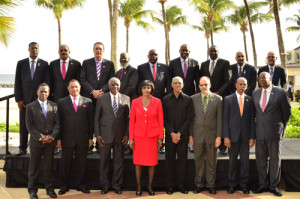 For just as long, I’ve been trying to disabuse them of their legally, politically and morally unsustainable demands.
For just as long, I’ve been trying to disabuse them of their legally, politically and morally unsustainable demands.
I tried in such commentaries as “The Fatally Flawed Demands for Reparations for Slavery,” February 16, 2007, and “CARICOM Demands for Reparations Smack of Extortion,” November 4, 2013. Most recently I laid out a ten-point rebuttal against Reparations in “French Forgiving Haitians like Germans forgiving Jews,” May 14, 2015. Not least because, given that “Britain emancipated its enslaved people” in 1833, reparations today countenances the unconscionable specter of Britons paying for the sins of their (fore)fathers on the one hand, and Caribbean natives receiving unjust enrichment on the other.
Correlatively, in “French Forgiving Haitians like Germans Forgiving Jews,” May 14, 2015, I proffered a 10-point argument against reparations for slavery and for debt relief.
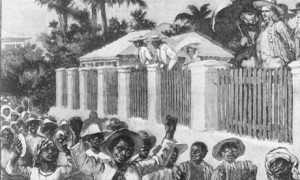 By instructive contrast, I’ve urged CARICOM leaders to focus their efforts on more legally, politically and morally sustainable demands for reparations for colonial atrocities, using the case of Kenya’s Mau Mau rebellion as precedent.
By instructive contrast, I’ve urged CARICOM leaders to focus their efforts on more legally, politically and morally sustainable demands for reparations for colonial atrocities, using the case of Kenya’s Mau Mau rebellion as precedent.
I urged them in such commentaries as “Reparations from Britain for Colonialism?” July 18, 2012, and “Britain Apologizes and Pays for Colonial Atrocities,” June 7, 2013.
But frankly, I am loath to continue beating this dead horse … too much; especially given that my comprehensive points against reparations remain uncontroverted. Instead, I shall suffice to reprise this excerpt from the above-cited “CARICOM Demands for Reparations Smack of Extortion.”
__________________
I just hope the damning irony is not lost on any proud African that, 50 years after decolonization, hundreds of Africans (men, women, and children) are risking their lives, practically every day, to subjugate themselves to the paternal mercies of their former colonial masters in Europe.
(“Lampedusa Tragedy Highlights Europe’s ‘Haitian’ Problem,” The iPINIONS Journal, October 7, 2013)
CARICOM [leaders] have been more dogmatic in trying to force former European colonizers to pay for slavery than Senator Ted Cruz and the Tea Party have been in trying to force President Obama to repeal Obamacare. Like Cruz and the Tea Party, CARICOM [leaders] are banking on public shaming and political pressure to compensate for shortcomings in their legal case.
Their mercurial strategy assumes that, just as corporations often settle cases (even frivolous ones) to avoid bad publicity, European governments will settle out of court, instead of forcing them to prove their case. Which, of course, would constitute a triumph of European paternalism and self-recrimination over Caribbean pride and self-responsibility – the ‘damning irony,’ in our case, be damned.
___________________
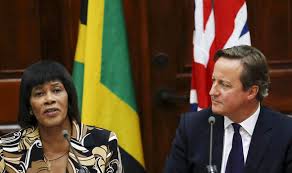 Alas, Jamaican leaders decided to seize the occasion of British Prime Minister David Cameron’s recent state visit to bully and/or shame him into acceding to their demands; this, despite longstanding British opposition to paying reparations for slavery.
Alas, Jamaican leaders decided to seize the occasion of British Prime Minister David Cameron’s recent state visit to bully and/or shame him into acceding to their demands; this, despite longstanding British opposition to paying reparations for slavery.
Ahead of his trip, Sir Hilary Beckles, chair of the CARICOM Reparations Commission, has led calls for Cameron to start talks on making amends for slavery and referenced the prime minister’s ancestral links to the trade in the 1700s through his cousin six times removed, General Sir James Duff…
‘If it is not on the agenda, I will not attend any functions involving the visiting prime minister, and I will cry shame on those who do, considering that there was not a dissenting voice in the debate in parliament,’ [Mike Henry MP] told the newspaper.
(The Guardian, September 28, 2015)
But Cameron was unmoved:
We do not believe reparations is the right approach.
(The Associated Press, September 30, 2015)
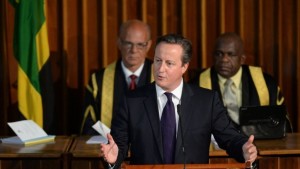 Not quite a Thatcheresque, No. No. No; but this amounted to a firm rejection all the same.
Not quite a Thatcheresque, No. No. No; but this amounted to a firm rejection all the same.
Cameron even rejected calls for a formal apology, clearly mindful of the legal implications that would entail. Instead, in his address to the Jamaican Parliament, he channeled former PM Tony Blair’s expression of “deep sorrow” by duly acknowledging that “[these wounds of Slavery] run very deep indeed.” But he made clear his intent to “move on [and] strengthen the bonds between the UK and the Caribbean.”
Accordingly, he did what British leaders have been doing since the abolition of slavery – pursuant to what might be described as an unbroken cord of moral obligation. He offered CARICOM leaders a “major new package” of £360 million (US$550 million) in development aid.
I am launching a new UK-Caribbean Infrastructure Partnership to build real, tangible things that will make a difference for people across the Caribbean…
[This is] not tied aid… It is up to you in this room and in the region to decide how best to spend it on the things that your country needs most…
This represents more than a quadrupling of Britain’s support [making us the largest bilateral donor to the region, and] you can take it – literally – as a concrete statement of my commitment to the Caribbean.
(Gov.uk, September 30, 2015)
Mind you, the operative phrase of his address was: “It is up to you in this room … to decide how best to spend it.” Because anyone who knows anything about Caribbean politics knows that the only people who will receive any personal benefit from this aid are CARICOM leaders, their family members and their political and business cronies. And the same would obtain if CARICOM leaders were to extract (or extort) billions in reparations for slavery.
Unsurprisingly, many regional commentators dismissed Cameron’s aid package as tantamount to “throwing a bone.”
Except that whatever cynicism they ascribe to Cameron pales in comparison to the cynicism inherent in CARICOM leaders taking hundreds of millions, if not billions, in UK aid over the years, and still demanding reparations.
What’s more, as I argued in the commentaries cited above, Caribbean natives have reaped billions in (compensatory?) benefits from transforming British institutions related to education, good governance, and civil society. We have also reaped, and continue to reap, benefits from security cooperation on, among other things, drug trafficking and climate change.
Hell, many putatively independent CARICOM countries remain so intent on exploiting their colonial ties to Britain that they see no point in establishing national courts of last resort. They are perfectly content to continue having their citizens appeal to the UK Privy Council in London. This, despite public entreaties by UK jurists, most notably Lord Phillips, for these former colonies to “set up their own final courts of appeal instead.” I lamented this willful abnegation of judicial independence in “No More Privy Council; Take Care of Your Own Judicial Mess,” October 8, 2009.
In any event, I fear CARICOM leaders remain as committed to collecting reparations for slavery as Cruz and the Tea Party are to repealing Obamacare. It’s a toss-up as to which of these pursuits is more legally frivolous, politically delusional, and morally repugnant.
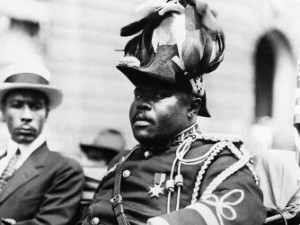 Ultimately, there’s no denying that, even though a perverse assertion, slavery was “godsend” for those of us born free in the Caribbean.
Ultimately, there’s no denying that, even though a perverse assertion, slavery was “godsend” for those of us born free in the Caribbean.
CARICOM’s “10-point action plan for reparations” calls for repatriation of descendants of slavery. I submit, however, that Blacks born in America and the Caribbean probably thank their lucky stars that neither Abraham Lincoln nor Idi Amin doppelganger Marcus Garvey succeeded in “repatriating” Blacks to Africa.
Related commentaries:
fatally flawed demand…
Reparations colonialism…
French forgiving Haitians…
Britain apologizes and pays…
No more privy council…
Privy council debate…